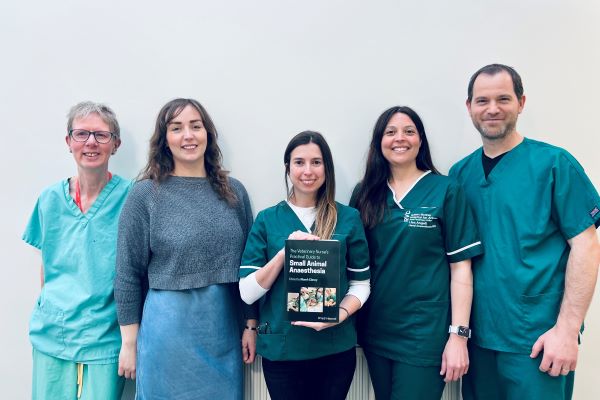RVC nurses launch first-ever practical small animal anaesthesia guide fully written by and for RVNs
Registered veterinary nurses (RVN) at the Royal Veterinary College (RVC) have launched a practical guide to small animal anaesthesia. The book, titled ‘The Veterinary Nurse's Practical Guide To Small Animal Anaesthesia’ was published earlier this month and is the first-ever to be fully written by RVNs for RVNs.

The book was created after anaesthesia nurses at the RVC’s Queen Mother Hospital for Animals in Hertfordshire discussed the need for a practical guide to anaesthesia and its potential complications, particularly one that was written fully by RVNs for the RVN in practice. It is hoped that the publication of this book will empower RVNs with knowledge that can help them provide anaesthesia management that is as safe as possible for those in their care.
Niamh Clancy, Anaesthesia RVN and Teaching Fellow at the RVC set out to make this a reality and after approaching Wiley, a book deal was agreed. A group of RVNs from the RVC then worked together to produce the book. The RVNs were all specialist anaesthesia nurses with a range of qualifications, including an American Vet Tech Specialist (VTS) in anaesthesia and analgesia and other RVNs with the national cert in anaesthesia and analgesia and a PGCert AVN in anaesthesia and analgesia.
The guide discusses each part of the anaesthetic process from start to finish. This includes the choice of anaesthetic agents, monitoring equipment that can be used and a case study section that discusses some commonly seen patients and makes suggestions of how the RVN in practice could approach these. The guide also discusses monitoring equipment that can be used in the peri-anaesthetic period and provides a quick reference guide at the end of each chapter that can be used in specific emergency situations.
Niamh Clancy, Anaesthesia RVN, Teaching Fellow and Deputy Co Course Director for the Certificates in Advanced Veterinary Nursing and Module Leader for Anaesthesia at the RVC, said:
“Constructing this practical guide has been a labour of love for all of us. Since the first conception of the idea in the recovery room of the QMHA, we wanted this book to be by RVNs for RVNs and to be an essential and accessible guide for the RVN in practice.”
Perdi Welsh, Director of Veterinary Nursing, Principal Teaching Fellow and Course Director for Certificates in Advanced Veterinary Nursing and School of Veterinary Nursing at the RVC, added:
“This book by our anaesthesia RVNs is built up from many years working in a highly collaborative and supportive team environment and it's great to see this team passing on their knowledge, expertise and experience to empower others in their learning.
It's an essential read for anyone doing anaesthetics; VNs and vets in clinical practice, to help them gain confidence in being able to deal with all aspects of small animal anaesthesia."
Note to Editor
Picture caption (L-R):
- Carol Hoy, Senior Anaesthesia RVN; contributor
- Niamh Clancy, Anaesthesia RVN and Teaching Fellow; editor and contributor
- Ana Costa, Anaesthesia RVN; contributor
- Lisa Angel, Head Anaesthesia RVN; contributor
- Ioan Holban, Anaesthesia RVN; contributor
For media enquiries, please contact:
- Jasmin De Vivo (jasmin.devivo@plmr.co.uk) or rvc@plmr.co.uk
- Press Line: 0800 368 9520
About the RVC
- The Royal Veterinary College (RVC) is the UK's largest and longest established independent veterinary school and is a Member Institution of the University of London.
- It is one of the few veterinary schools in the world that hold accreditations from the RCVS in the UK (with reciprocal recognition from the AVBC for Australasia, the VCI for Ireland and the SAVC for South Africa), the EAEVE in the EU, and the AVMA in the USA and Canada.
- The RVC is ranked as the top veterinary school in the world in the QS World University Rankings by subject, 2023.
- The RVC offers undergraduate and postgraduate programmes in veterinary medicine, veterinary nursing and biological sciences.
- The RVC is a research-led institution, with 88% of its research rated as internationally excellent or world class in the Research Excellence Framework 2021.
- The RVC provides animal owners and the veterinary profession with access to expert veterinary care and advice through its teaching hospitals and first opinion practices in London and Hertfordshire.
You may also be interested in:
-
The RVC maintains top performance in Knowledge Exchange Framework for fifth year
The Royal Veterinary College (RVC) has once again secured strong results in the fifth Knowledge …

